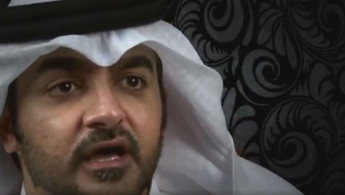Qatar condemns UAE media for airing forced confession of 'tortured and abused' security officer
Doha said on Friday that footage of Hamad al-Hammadi admitting to plotting against the UAE was taken after he was tortured by security officers while in detention in the neighbouring state.
"Hammadi was filmed under duress, torture and maltreatment while he was detained by Emirati State Security in 2014," Sheikh Saif Al Thani, the director of Qatar's communications office, said in a statement.
In June 2014, Hammadi travelled for a holiday to the UAE, where he was arrested along with another Qatari citizen as they attempted to enter through the Ghuwaifat border crossing, Sheikh Saif said.
Hammadi was detained illegally, forced to confess to trumped up charges and convicted in a state security court after being denied access to a civilian judge, he added.
Emirati authorities released the 33-year-old in May 2015 after serving less than a year of his ten year sentence for "attempting to ruin the reputation of the UAE".
The arrests took place during the first Gulf diplomatic crisis in 2014, when Saudi Arabia, the UAE and Bahrain recalled their ambassadors over Qatar's alleged support for the Muslim Brotherhood in Egypt.
"We are not surprised that these media outlets have falsified the facts and violated professional values to push their biased political agendas," Sheikh Saif said.
On Thursday evening, the state-run Emeriti channels Abu Dhabi TV and Emarat TV aired footage of the security officer admitting to his alleged role in a plot to slander the leadership of the UAE and Saudi Arabia.
He claimed that he was tasked with setting up fake social media accounts, designed to appear as Emiratis, to "sow dissent" among people in the UAE.
The interview was broadcast as the ongoing Gulf diplomatic crisis between Qatar and its neighbours shows no signs of abating.
On Friday, Saudi Arabia and allies boycotting Qatar issued a list of demands that includes shutting down the Doha-based al Jazeera channel and cutting diplomatic ties to Iran.
Saudi Arabia, the United Arab Emirates, Egypt and Bahrain led a string of countries that this month cut ties with Qatar over what they say is the emirate's financing of extremist groups and its ties to Iran, Saudi Arabia's regional arch-rival.
Qatar vehemently denies having any ties to extremists.
Saudi Arabia and its allies have been suspected of extensively using cyber warfare and social media propaganda campaigns as tools to target Doha.
The crisis itself was triggered by the hacking of Qatar News Agency, with the hackers planting fabricated controversial remarks by the country's emir to incite a fake news-inspired outrage.
Qatar has said it is the victim of an orchestrated smear campaign in sections of the media over its alleged "support" for terrorism.





 Follow the Middle East's top stories in English at The New Arab on Google News
Follow the Middle East's top stories in English at The New Arab on Google News


